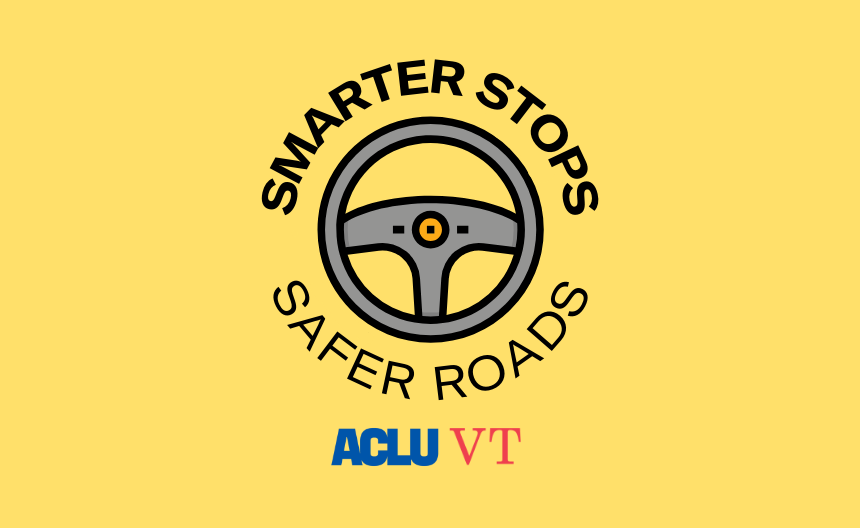Many of us can recount a time (or several times) when we were pulled over by law enforcement while driving. Traffic stops are the most common way that people interact with law enforcement, but these stops can be far from routine. They can lead to fines, searches, arrests, and even physical harm--disproportionately affecting Black and Brown drivers.
All Vermont residents deserve to feel secure in our communities. This includes the freedom to travel our roadways without experiencing unnecessary interactions with police. That's why we're calling on legislators to allow traffic stops for serious safety violations only, not for minor equipment and administrative violations.
The passage of a Smarter Stops bill (H.176 or S.257) would reduce discriminatory practices, improve community safety, and better define the role of police in our communities.
The status quo is harming Vermonters
Vermont motorists are overpoliced—pulled over at rates far higher than the national average. That amounted to 255 drivers stopped per 1,000 residents, compared to 86 drivers per 1,000 residents nationally, between 2015 and 2019. During that same period, Vermont sheriffs increased their stops by 86 percent, while Vermont State Police upped theirs by nearly 50 percent.
The data is clear that Black and Latinx drivers are disproportionately impacted by over-enforcement on our roadways. From 2015-2019 Black drivers were stopped 80% more often than white drivers and searched at 3.5 times the rate, though they are less likely to be found with contraband. Latinx drivers were 26% more likely to be stopped than white drivers, and almost 4 times more likely to be searched.
Resulting from conscious or unconscious officer bias, BIPOC drivers are also more likely than white drivers to be pulled over for low-level violations that do not affect the safety of others, such as a broken taillight or an obscured license plate.
These situations are often called “pretextual stops” or “non-public safety stops” because officers use minor infractions as a reason to pull over motorists and search them for drugs, weapons, or other potential legal violations, often based only on harmful and inaccurate stereotypes. Pretextual stops increase unnecessary interactions between BIPOC motorists and police, putting BIPOC at greater risk of experiencing police violence.
Stops for minor infractions can also lead to unnecessary roadside danger for law enforcement and motorists alike. When a vehicle is pulled over, it becomes vulnerable to crashes, endangering officers and first responders working at the scene, in addition to the driver. Approximately 566 people are killed and 14,371 injured each year in crashes on all types of roads involving a stationary vehicle that oncoming traffic had difficulty seeing.
A solution in sight
Fortunately, there is an obvious solution, one that a growing number of jurisdictions are successfully adopting. Our laws should only allow traffic stops for serious safety violations, not for minor infractions that pose no threat to others. H.176 or S.257, bills before the Vermont legislature, would do precisely that.
In 2022, Philadelphia became the first major city to ban low-level traffic stops, in response to studies showing that Black drivers are disproportionately pulled over for minor infractions. In the first year the law was enacted, stops associated with low-level violations dropped by 54%, eliminating nearly 16,000 interactions between civilians and law enforcement.
In 2021, a county prosecutor in Minneapolis stopped prosecuting felony cases that arose from traffic stops for minor equipment and registration violations. As a result, traffic stops fell by 86 percent among police departments that worked with the prosecutor’s office. Black drivers experienced the largest decrease in these kinds of traffic stops, seeing a 66 percent drop in the number of stops per capita.
The Minneapolis policy also reduced the amount of time police spent making stops that had nothing to do with traffic safety. Those interactions represented 25 percent of all traffic stops prior to this policy change but fell to just 5 percent after September 2021.
Here in Vermont, Chittenden County State’s Attorney Sarah George implemented a similar policy to decline to prosecute cases that arise from low-level stops, and the results have been significant. In Burlington, annual traffic stops dropped from 3,500 five years ago to under 500 in 2022 and 2023. Police Chief Jon Murad said approvingly of the sizable reduction, “Traffic stops that are done for anything other than a public safety reason are not something we want to prioritize our time doing.”
Where do we go from here?
In 2024, we are advocating for legislators to pass H.176 or S.257. Under these "Smarter Stops" bills, police would stop drivers only for offenses that could harm others, not for minor equipment and administrative violations. The legislation would reduce discriminatory practices, improve community safety, and better define the role of police in our community.
The ACLU and our partners see a future where minor infractions around one’s vehicle, such as an expired registration, obstructed license plate, or broken taillight, would be addressed by other means than a traffic stop.
In Fall 2023, the Office of Racial Equity conducted listening sessions to solicit public feedback on how traffic enforcement is impacting our communities, and hope that people will continue to document their experiences with traffic enforcement.
Changing the ways our roadways are policed can be one of the most direct ways to further community safety and racial and economic justice in our state. By making “Smarter Stops,” Vermont can protect the safety and liberty of everyone on the road.

